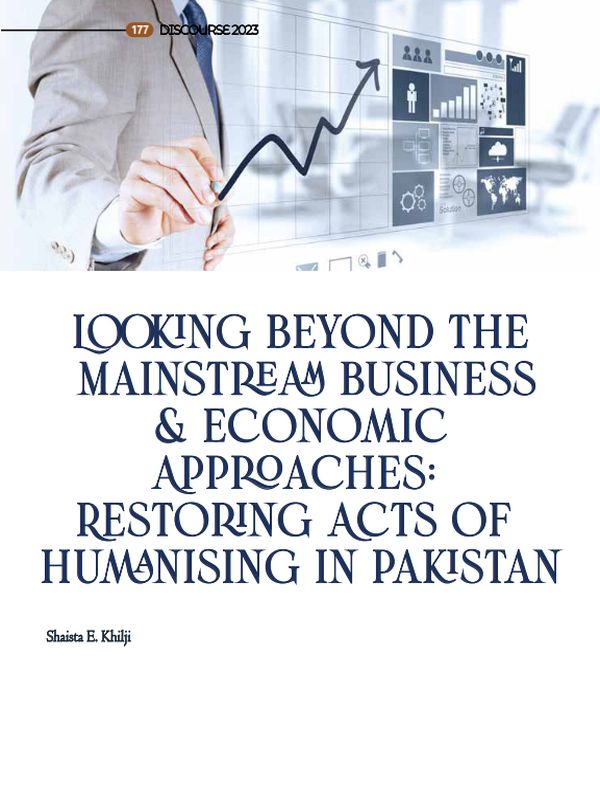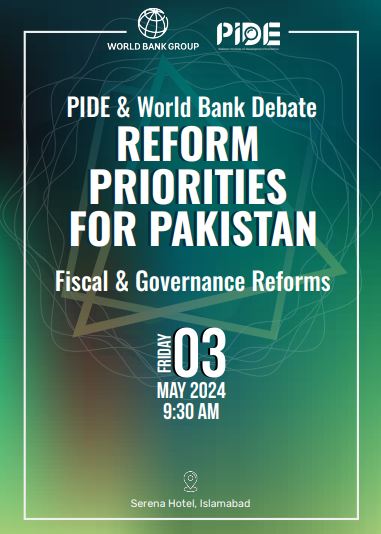Looking Beyond the Mainstream Business & Economic Approaches: Restoring Acts of Humanising in Pakistan
With a population of 242 million, Pakistan is the world’s fifth most populous country in the world. It will likely overtake Indonesia as the fourth most populous and the largest Muslim country by 2030. It has a relatively young population with a median age of 20.6 years. These demographics make Pakistan highly relevant in the global labour market, particularly considering a ‘global talent race.’ Within this context, it is important to ask: how does Pakistan meet the challenge of preparing its workforce for the global labour market? In answering this question, we must first consider the history of Pakistan’s economic development and the follies of the Western governance processes that have perpetuated systems of inequities and dehumanised large swaths of global populations. I believe the global economic governance, mainstream management practices, and the story of Pakistan’s socio-economic development are inextricably linked. In this piece, I explain how to outline the importance of rethinking managerial and economic processes to focus on humanising so that we can promote dignity and well-being within organisations.
Since its independence, Pakistan has persistently relied on international financial institutions for economic assistance. This has resulted in large amounts of external debt, to the extent that Pakistan has the fifth biggest outstanding debt with the IMF. The enormous external debt places significant repayment pressures and risks an economic default. As a result, Pakistan repeatedly has to resort to financial bailouts from the IMF. However, these bailouts have come with pressures to liberalise its economy and overbearing austerity measures – creating a vicious cycle of increasing the debt-to-GDP ratio, raising the budget deficit, heightening economic uncertainty, greater default risk, and yet another bailout. In analysing the economic situation, many economists have blamed the gross mismanagement and corrupt or even inadequate economic policies in Pakistan. I agree. However, we also need to pay attention to the neocolonial assumptions of global economic governance systems to capture a more complete picture.
In a historical analysis of international financial institutions[1], Jamie Martin outlines the supremacist interventions of the IMF and the World Bank that have created a global power imbalance aimed at protecting the interests of a few nations with voting power at the expense of others. He argues that the IMF and the World Bank have created an exploitative and unequal international economic order, imposing strict policy conditions on their loans that leave ordinary people worse off. As an example, the recent bailout agreements funded by the IMF have aggravated food insecurity, worsened energy dependency, and increased socio-economic inequalities in Pakistan. It is also important to mention that the past several decades’ structural readjustment programs and liberalisation efforts have created abysmal labour conditions and weakened trade unions.
Further, it has also been argued that under the guise of economic assistance, these international financial institutions serve as neocolonial states – leveraging conditional loans to sway another country’s foreign policy. A complete reliance on the global economic governance system has influenced developing countries to liberalise their economies mindlessly, and strict interventionist policies of structural readjustments have contributed to economic degradation, political instability, and worker mistreatment in many Asian, African, European, and Latin American countries.
This brings me to the labour market and talent development issues. Here, we also see the dominance of American and Western European approaches over business activities and mechanisms, which are based on assumptions drawn from samples that predominantly emanate from the US, Europe, and other English-speaking countries. As a result, there is a systematic WEIRD (western, educated, industrialised, and democratic) bias in business and management that favors settler, white, masculine, and neoliberalist values. For example, mainstream leadership development models present leaders as saviors, demigods, or heroes who can transform organisations with the right traits or skills. Such oversimplification has narrowed leadership to a goal-focused activity and dehumanised leaders by breaking their ties with local communities and contexts[2]. Still, despite these limitations, mainstream leadership development approaches are replicated in mass and have created a global cadre of immoral leaders who lack concern for society and tout hubris and greed as their virtues. It is, hence, little surprise that public trust in leaders is low globally[3].
The presumed epistemic superiority of Western knowledge runs deep and has adversely affected the global population by upholding the colonial enterprise and reinforcing socio-economic inequalities. First, it has reproduced colonial differences by defining the problems of the developing world and articulating possible solutions solely from a market economy perspective. This has helped solidify Western solutions as a panacea to local problems. Hence, when countries like Pakistan buy into Western-biased solutions wholesale for investment and reform purposes, they produce conditions for suppressing local knowledge and norms. Second, Western epistemic superiority has been institutionalised as the only scientific rational knowledge. This has denigrated local knowledge as superstitious and traditional. Finally, those who adopt Western economic and business norms are rewarded with the status of the ‘global elite’. Their integration into the global economy often disconnects them from the general masses and their local communities, values, and knowledge. In sum, through these mechanisms and mindsets, the domination of Western knowledge in the last several decades has led to socio-economic disintegration, dehumanisation of local communities, and the gradual destruction of local values and ways of life globally.
From my vantage point, dehumanisation and persistent inequities are the most significant flaws of mainstream economic and management approaches. Dehumanisation of those who don’t fit in, workers, trade unions, and even leaders; and inequities of have-have nots/ elites-masses, etc. These problems test our ability to live with dignity and work towards human and planetary well-being. Hence, as we hear renewed calls for justice, equity, and workers’ exhaustion with managerial practices that over-emphasise economic efficiency and relegate their well-being, it is an opportunity for us to dismantle the colonial claims. This begins with a willingness to investigate non-Western contexts and create a robustly diverse knowledge base. I believe that actively tapping into non-western ways of living, thinking, and being will help us connect with, redefine, and solve today’s grand problems (for example, socio-economic inequities, poverty alleviation, and environmental degradation) much more effectively and also enable us to construct newer approaches and practices in managing economies and organisations more humanistically[4].
Earlier, I posed the question: how does Pakistan meet the challenge of preparing its workforce for the global labour market? I would reiterate that Pakistan’s demographics present an immense opportunity for the global labour market. However, opportunities must be approached with responsibility and creativity. I would encourage policymakers, leaders, and citizens alike to decolonise their minds first. This requires, first and foremost, acknowledging Pakistan’s deep-seated colonial legacy (pre-1947 and since independence). Next, it is important to recognise the colonial basis of mainstream Western knowledge, address the historical exclusion of Pakistan in knowledge production, and make alternate (i.e., local and Pakistan-specific) ways of knowing visible[5]. In other words, decolonising will mean freeing Pakistan of Western superiority, being comfortable with the Pakistani culture and knowledge base, and reclaiming our distant history to reframe a better future for ourselves.
In this discussion, I want to centralise the acts of humanizing, which are sorely missing in mainstream economic and management approaches[6] , to a) protect human dignity and promote planetary well-being and b) distinguish Pakistan in the global market. But first, we must learn to uphold our dignity as Pakistanis. By that, I mean setting aside the gloom and doom of the Pakistani markets and rejecting the dehumanisation of its people. Pakistani population will be far ahead in the ‘global talent race’ as long as it asserts local knowledge with measured confidence and focuses on a) promoting individual dignity, equality, uniqueness, and capacity for growth, b) respect for the individual, c) fostering ‘ethics of care’, and d) a concern for the common good. In view of an emerging homeland or regional economics, it requires meeting the world on our terms – with our minds, problems, and solutions. However, we must still respect their dignity, protect our own, and care for the collective good.
I know that Pakistanis have a rich history supporting these values. We just have to refresh our collective memories and restore our ties with our cultural norms to practice ‘acts of humanising’. This is the key to building uniquely Pakistani talent and boosting well-being within Pakistani and global organisations.
The author is a professor of human and organizational learning and international affairs at George Washington University and the founder of the Humanizing Initiative, a research institute and consultancy.
[1] Martin, J. (2022). Meddler- sovereignty, empire, and the birth of the global economic governance. Cambridge, MA: Harvard University Press.
[2] Khilji, S. E. (2021). An Approach for Humanizing Leadership Education: Building Learning Community & Stakeholder Engagement. Journal of Management Education, https://doi.org/10.1177/10525629211041355
[3] Edelman Trust Barometer. 2023. Navigating a polarized world- 2023 Edelman Trust Barometer. Available at: https://www.edelman.com/trust/trust-barometer
[4] Nelsen, J. (2006). Economics for humans. The University of Chicago Press.
[5] Banerjee, S.B. (2022). Decolonizing deliberative democracy: Perspectives from below. Journal of Business Ethics, 181:283–299.
[6] Khilji, S.E. (2022). Moving past scientific management. In What would management look like in the next 100 years (Dukach, D.). Harvard Business Review, Sept 19, 2022. https://hbr.org/2022/09/what-will-management-look-like-in-the-next-100-years





